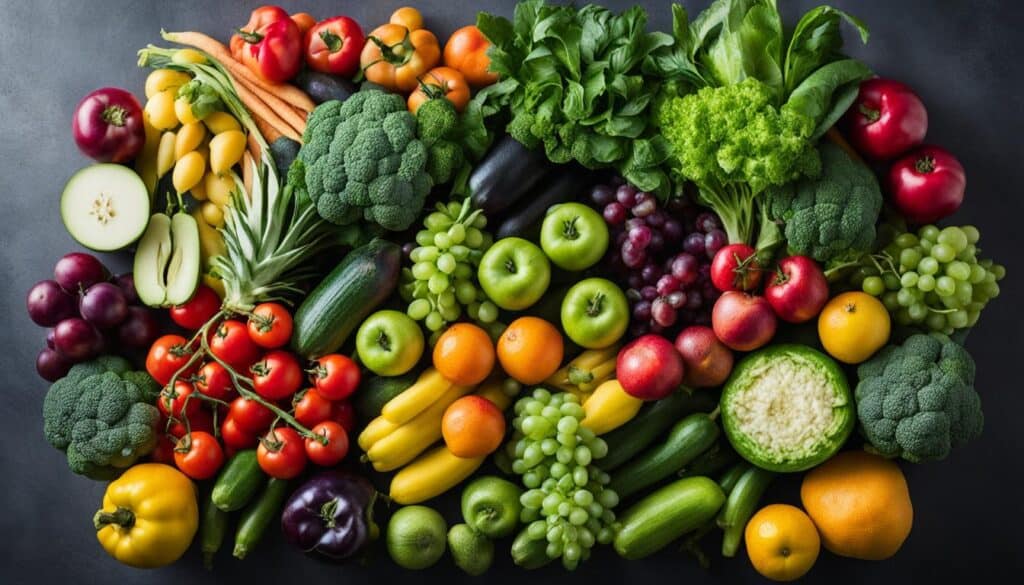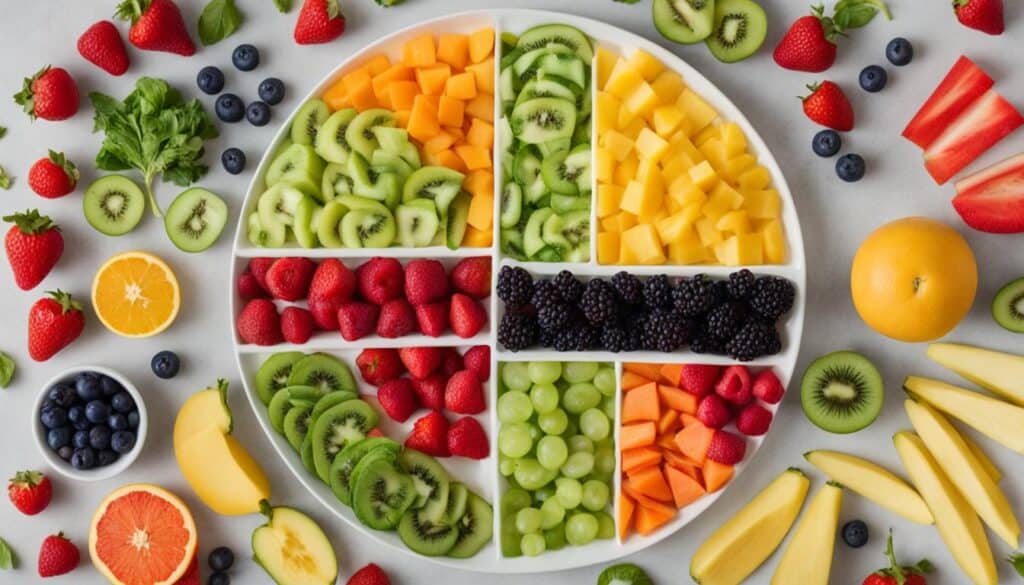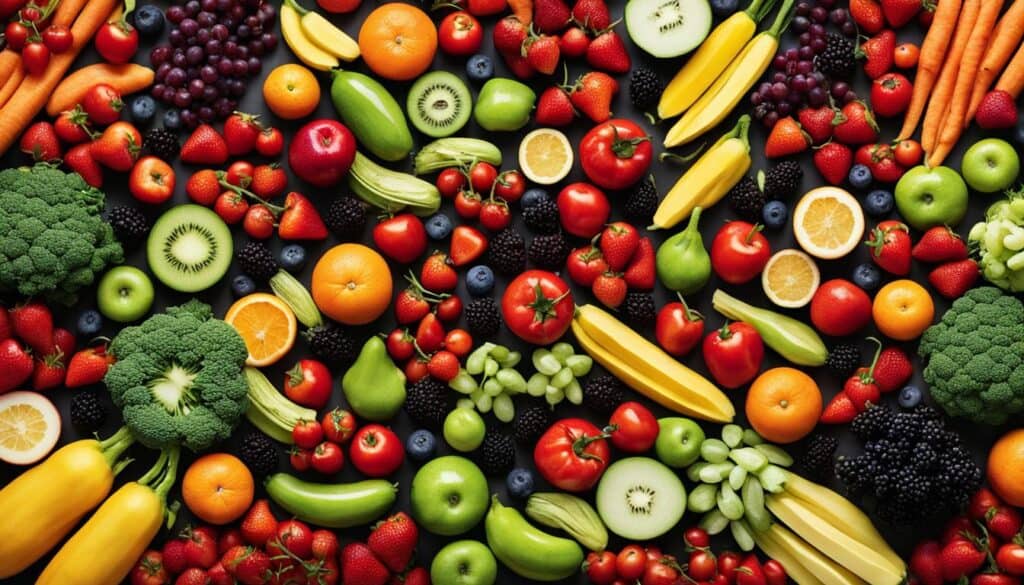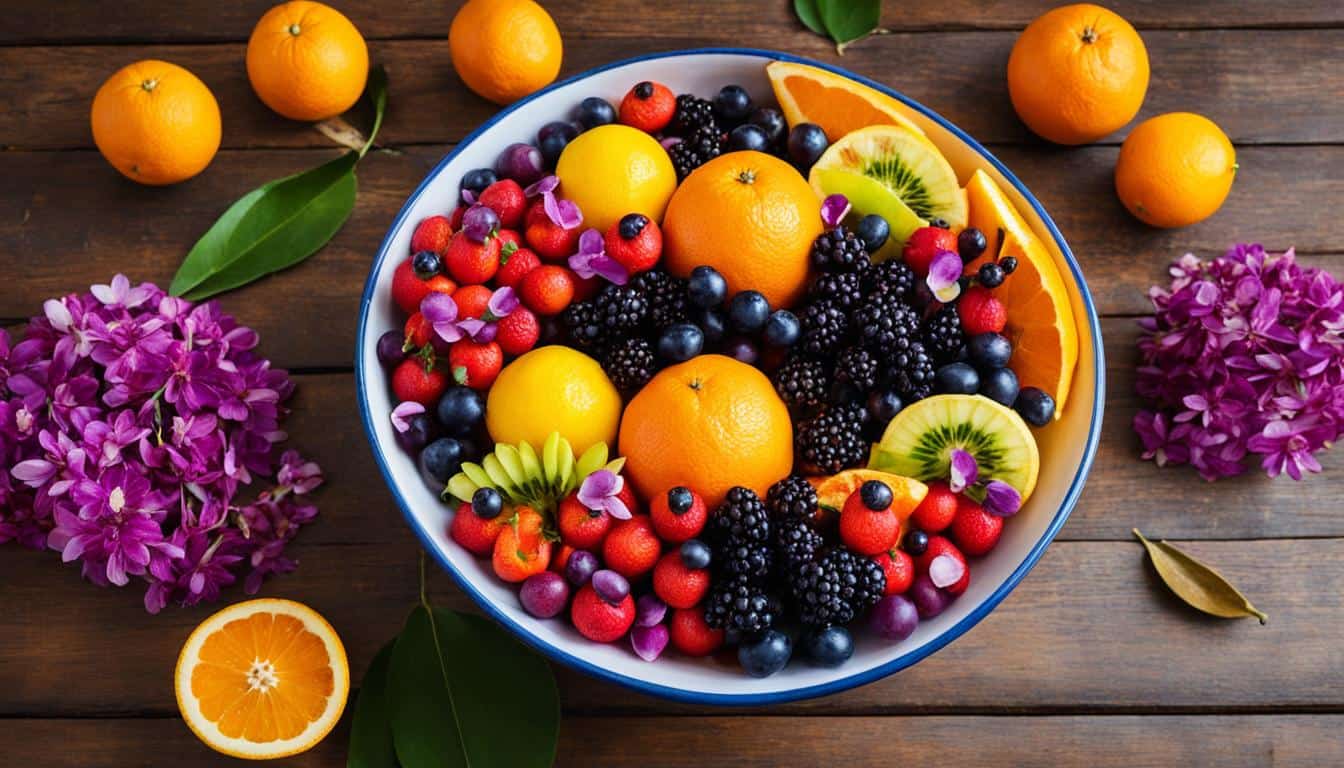Hello, my name is [Your Name] and I’m here to shed light on the age-old question: Can fruit replace vegetables in our diets? As a professional copywriting journalist and health enthusiast, I’ve delved into the topic to provide you with an informed and balanced perspective.
When it comes to maintaining a healthy diet, we all know the importance of eating fruits and vegetables. They are packed with essential nutrients, vitamins, and minerals that support our overall well-being. But are they interchangeable? Let’s find out!
Key Takeaways:
- Fruits and vegetables offer different nutrient profiles, both vital for a healthy diet.
- Canada’s Food Guide recommends consuming an abundance of fruits and vegetables for their disease-fighting nutrients.
- Substituting fruits for vegetables can increase nutrient intake for picky eaters.
- While fruits have higher sugar content, whole fruits are preferable over juice or dried fruit.
- A balanced diet that includes both fruits and vegetables is essential for optimal health and nutrition.
Now that we’ve set the stage, let’s take a closer look at the nutritional profiles and benefits of fruits and vegetables in Section 2.
Fruits and Vegetables – Nutritional Profiles and Benefits
When it comes to maintaining a healthy diet, it’s no secret that fruits and vegetables play a crucial role. These colorful and vibrant foods are not only delicious but also packed with essential nutrients that are vital for our overall well-being.
Fruits and vegetables are not created equal in terms of their nutritional value. While they both provide vitamins and minerals, they have distinct nutrient profiles that make them unique. Let’s take a closer look at the benefits they offer:
Fruits – A Burst of Nutrients
Fruits are nature’s sweet treats, offering a wide range of health benefits. They are excellent sources of fiber, which aids in digestion and helps maintain a healthy weight. Fruits also contain essential vitamins such as vitamin C and vitamin E, which support immune function and promote healthy skin.
One notable advantage of fruits is their high antioxidant content. Antioxidants help protect our cells from damage caused by harmful free radicals and reduce the risk of chronic diseases. From berries packed with anthocyanins to citrus fruits rich in vitamin C, incorporating a variety of fruits into your diet can provide a diverse array of antioxidants.
Vegetables – Nourishment for Vitality
Vegetables, on the other hand, offer their own unique set of health benefits. They are a fantastic source of dietary fiber, which aids in digestion and helps us feel full and satisfied. Leafy green vegetables like spinach and kale are packed with important nutrients like folate and vitamins A, C, and E. These vitamins are essential for maintaining optimal health and supporting various bodily functions.
Cruciferous vegetables such as broccoli, cauliflower, and Brussels sprouts contain special compounds called glucosinolates. These compounds have been linked to anti-cancer properties and may help reduce the risk of certain types of cancer.
The Importance of Variety
Including both fruits and vegetables in your diet is essential to reap the full spectrum of nutritional benefits. The combination of their unique nutrient profiles ensures a well-rounded intake of essential vitamins, minerals, and phytochemicals.
To better understand the nutritional content of various fruits and vegetables, refer to the table below:
| Fruits | Key Nutrients | Health Benefits |
|---|---|---|
| Apples | Fiber, vitamin C | Aids digestion, supports immune function |
| Berries | Antioxidants, fiber | Protects against oxidative stress, promotes heart health |
| Citrus Fruits | Vitamin C, folate | Boosts immune system, supports healthy pregnancy |
| Vegetables | Key Nutrients | Health Benefits |
|---|---|---|
| Leafy Greens | Vitamins A, C, E, folate | Promotes eye health, supports immune function |
| Cruciferous Vegetables | Fiber, glucosinolates | Reduces cancer risk, supports detoxification |
| Root Vegetables | Potassium, vitamin C | Supports healthy blood pressure, boosts immune system |
By including a variety of fruits and vegetables in your daily meals, you can enhance your nutritional intake, strengthen your immune system, and support overall health and vitality.
Incorporating More Fruits into Your Diet
When it comes to incorporating more fruits into your diet, the possibilities are endless. Not only do fruits add a burst of flavor and natural sweetness to your meals, but they also provide a wide range of essential nutrients. By incorporating more fruits into your diet, you can enhance your overall well-being and enjoy the benefits of a varied and plant-based eating plan.
Fruit Options to Consider
If you’re looking to add more fruits to your diet, here are a few options worth considering:
- Kiwi fruit: Kiwi is an excellent choice as it is packed with essential vitamins and minerals, including vitamin C, vitamin A, folate, vitamin E, vitamin K, and potassium.
- Citrus fruits: Oranges and tangerines are not only refreshing but also rich in carotene, vitamin C, and pectin.
- Winter jujube: Winter jujube is a lesser-known fruit that is a great source of vitamin C and can be a delightful addition to your diet.
These fruits can be enjoyed in various ways. Whether you choose to eat them as a snack on their own or add them to dishes like yogurt or oats, their presence will contribute to a more diverse and nutritious eating plan.
The Importance of a Varied Diet
Incorporating more fruits into your diet is not only about adding vibrant colors and flavors to your plate. It’s also about promoting the importance of a varied diet. A varied diet ensures that you receive a wide range of nutrients, providing your body with the building blocks it needs for optimal health and well-being.
Each fruit brings its own unique combination of vitamins, minerals, and antioxidants to the table. By diversifying your fruit selection, you can expand your nutrient intake and reap the countless benefits that fruits have to offer.
Your Plant-Based Options
Incorporating more fruits into your diet is an excellent way to embrace a plant-based eating plan. Fruits are naturally plant-based and provide an abundance of nutrients without the need for animal products. By choosing fruits as a significant part of your meals, you can explore the benefits of a more plant-focused lifestyle.
For those who are seeking a plant-based diet, fruits are a delicious and convenient option. They not only provide essential nutrients but also offer a wide variety of flavors and textures that can satisfy your taste buds and keep you excited about eating healthily.
| Fruit | Nutrients | Benefits |
|---|---|---|
| Kiwi | Vitamin C, vitamin A, folate, vitamin E, vitamin K, potassium | Boosts immune system, supports healthy vision, aids digestion, promotes heart health |
| Oranges and tangerines | Carotene, vitamin C, pectin | Enhances skin health, supports immune function, aids in digestion |
| Winter jujube | Vitamin C | Boosts immune system, supports healthy skin, provides antioxidant properties |
As you can see, each fruit offers a unique combination of nutrients and benefits. By including them in your diet, you can create a diverse and nutritious eating plan that aligns with your plant-based goals.
Can Fruits Replace Vegetables for Picky Eaters?
If you have a picky eater who refuses vegetables, incorporating fruit substitutes into their diet can be a healthy alternative. Although fruits contain more calories and natural sugars compared to non-starchy vegetables, they offer essential nutrients and phytochemicals that are often lacking in other foods.
It’s important to ensure that the calories from fruits replace less healthy options such as sugary treats. By making fresh fruits the preferred choice over fruit juice or dried fruit, you can maximize the benefits. Fresh fruits contain higher fiber content and lower sugar content, contributing to a more balanced and nutritious diet.
When introducing fruit substitutes, it’s essential to emphasize the importance of a varied diet. While fruits provide many beneficial nutrients, they cannot replace the unique nutritional profiles found in vegetables. A combination of both fruits and vegetables ensures the intake of a wide range of vitamins, minerals, and phytochemicals necessary for optimal health and nutrition.
“Incorporating fruit substitutes into a picky eater’s diet can help increase their nutrient intake, but it’s crucial to educate them about the importance of a varied diet and the irreplaceable role vegetables play in maintaining overall health.”
Table: A Comparison of Nutritional Composition
| Fruit | Vitamins | Minerals | Phytochemicals |
|---|---|---|---|
| Banana | Vitamin C, Vitamin B6 | Potassium, Magnesium | Flavonoids, Carotenoids |
| Carrot | Vitamin A, Vitamin K | Potassium, Iron | Beta-carotene, Lutein |
| Apple | Vitamin C | Potassium | Quercetin, Catechins |
By understanding the unique nutritional profiles of different fruits and vegetables, you can create a balanced diet that caters to picky eaters’ preferences while ensuring their overall well-being and health.

With careful and creative planning, incorporating more fruit substitutes into a picky eater’s diet can open doors to a world of flavors, textures, and nutritional benefits. It’s a step towards building healthier eating habits and nourishing the body with a wide array of essential nutrients.
The Role of Fruits and Vegetables in Weight Management
When it comes to weight management, incorporating more fruits and vegetables into your diet can be incredibly beneficial. Not only are they low in fat and calories, but they also provide essential vitamins, minerals, and fiber that are essential for maintaining a healthy weight. By substituting low-calorie fruits and vegetables for higher-calorie ingredients, you can create lower-calorie versions of your favorite dishes without compromising on taste or nutrition.
The water and fiber content in fruits and vegetables add volume to your meals, allowing you to eat the same amount of food with fewer calories. This can help you feel more satisfied and full, which in turn can help reduce the risk of overeating and weight gain. Additionally, the high nutritional value of fruits and vegetables ensures that you’re getting the necessary nutrients while keeping your calorie intake in check.
One of the key benefits of incorporating more fruits and vegetables into your diet is their role in a plant-based diet. Plant-based diets have gained popularity for their potential health benefits, including weight management. Fruits and vegetables are the cornerstone of a plant-based diet, providing the necessary nutrients and fiber while being naturally low in fat and calories.
Here are some tips to help you incorporate more fruits and vegetables into your diet for effective weight management:
- Choose a variety of colorful fruits and vegetables to ensure you’re getting a wide range of nutrients.
- Add sliced fruits like berries, apples, or oranges to your morning cereal or oatmeal for a nutritious and filling breakfast.
- Include a side of steamed or roasted vegetables with your main meals to add bulk and increase satiety.
- Replace high-calorie snacks with fruits or vegetable sticks for a healthier option.
- Experiment with different cooking methods, such as grilling or stir-frying, to enhance the flavor of vegetables without adding excess calories.
Remember, incorporating more fruits and vegetables into your weight management plan is not about restriction or deprivation, but rather about making healthier choices and adopting a more balanced and sustainable approach to eating. By prioritizing these nutrient-rich foods, you can achieve your weight management goals while promoting overall health and well-being.

Tips for Cutting Calories and Adding Fruits and Vegetables
Looking to make healthier choices and incorporate more fruits and vegetables into your diet? Here are some simple tips that can help you cut calories while enjoying the benefits of these nutritious foods.
1. Breakfast Swap
Start your day off right by substituting vegetables like spinach, onions, or mushrooms for some of the eggs or cheese in your omelet. This adds extra nutrients and fiber while reducing the calorie content.
2. Lunch Makeover
Upgrade your lunch by replacing some of the cheese and meat in your sandwich with crisp lettuce, juicy tomatoes, refreshing cucumbers, or flavorful onions. This adds crunch, vitamins, and minerals without sacrificing taste.
3. Dinner Upgrade
Elevate the nutritional value of your dinners by adding chopped vegetables to your dishes while reducing the amount of rice or pasta. This increases the fiber content while keeping your calorie intake in check.
4. Smart Snacking
Instead of reaching for high-calorie snacks, opt for fruits and vegetables. They provide vitamins, minerals, and fiber while being naturally low in calories. Keep pre-cut fruits and veggies on hand for easy and nutritious snack options.
| Fruit | Calories per Serving | Vegetable | Calories per Serving |
|---|---|---|---|
| Apple | 95 | Spinach | 23 |
| Banana | 105 | Cucumber | 8 |
| Orange | 62 | Broccoli | 55 |
| Strawberries | 29 | Tomato | 22 |
| Grapes | 69 | Carrot | 41 |
Note: Calorie data provided is approximate and may vary.
By implementing these simple tips, you can easily cut calories and add more fruits and vegetables to your daily meals. With their numerous health benefits and delicious flavors, a healthy diet rich in fruits and vegetables is within your reach.

Making Fruits and Vegetables Part of Your Weight Management Plan
When it comes to weight management, incorporating fruits and vegetables into your diet can be a game-changer. Not only are these natural powerhouses packed with essential nutrients, but they also offer numerous health benefits that can support your overall well-being. Here, I’ll share some tips on how to make fruits and vegetables a central part of your weight management plan.
Eating Fruits and Vegetables in their Natural Form
To fully reap the health benefits of fruits and vegetables, it’s best to consume them in their natural form. By enjoying fresh produce, you’ll get the maximum amount of vitamins, minerals, and fiber they have to offer. Try incorporating a variety of colorful fruits and vegetables into your meals to provide a wide range of essential nutrients for your body.
Utilizing Low-Fat Cooking Techniques
When it comes to preparing vegetables, opt for low-fat cooking techniques such as steaming, grilling, or sautéing with minimal oil. These methods allow you to enhance the flavor of vegetables without adding excess calories. You can also use low-calorie dressings and herbs to add extra flavor and zest to your dishes, making them more enjoyable and satisfying.
Choosing Canned or Frozen Fruits and Vegetables
If fresh produce is not readily available, don’t worry! Canned or frozen fruits and vegetables can be great alternatives. However, it’s important to select options that do not contain added sugar or cream sauces. Be sure to read the labels and choose varieties that retain their nutritional value without any unhealthy additives.
Opting for Whole Fruits over Fruit Drinks and Juices
While fruit drinks and juices may seem convenient, they often lack the fiber content found in whole fruits. To ensure you’re getting all the nutritional benefits, prioritize whole fruits over processed forms. Fresh fruit provides the added benefit of fiber, which aids in digestion and helps you feel fuller for longer.
Substituting Fruits and Vegetables for Higher-Calorie Foods
The key to a successful weight management plan is to replace higher-calorie foods with fruits and vegetables. For example, swap out calorie-dense snacks like chips or cookies for fresh fruit or raw vegetables with hummus. By making these simple substitutions, you can create a calorie deficit while still satisfying your hunger and nutritional needs.
| Fruit and Vegetable Substitutions | Higher-Calorie Foods | Benefits |
|---|---|---|
| Apple slices with peanut butter | Candy bars or sugary snacks | Nutrient-rich snack, high in fiber and protein |
| Vegetable stir-fry with tofu | Fast-food meals | High-protein, low-calorie option packed with vitamins and minerals |
| Greek yogurt with mixed berries | High-sugar yogurts | Probiotic-rich and antioxidant-packed snack |
By incorporating these strategies into your weight management plan, you can enjoy the health benefits of fruits and vegetables while working towards achieving your weight goals. Remember to focus on creating a balanced diet that includes a variety of nutrient-dense foods. With commitment and small changes over time, you can create a sustainable and healthy lifestyle for yourself.

Next up, let’s wrap things up with a conclusion that highlights the importance of including both fruits and vegetables in a well-rounded diet.
Conclusion
While fruits provide essential nutrients and phytochemicals, they cannot completely replace vegetables in a healthy diet. Both fruits and vegetables offer unique nutritional profiles and benefits that are crucial for our overall health. Incorporating a variety of fruits and vegetables into your daily diet is the best way to ensure a wide range of vitamins, minerals, and phytochemicals.
For individuals who struggle with including vegetables in their meals, substituting fruits can be a helpful alternative to increase nutrient intake. However, it’s important to be mindful of the higher sugar content in fruits and choose whole fruits over juice or dried fruit. Balancing your diet with a combination of fruits and vegetables is essential for optimal health and nutrition.
A plant-based diet that includes both fruits and vegetables is a great option for those looking to prioritize their health. By incorporating more plant-based options into your meals, you can enjoy the nutritional benefits of fruits and vegetables while reducing your intake of animal products. Whether you’re a picky eater or simply wanting to make healthier choices, a well-rounded plant-based diet can provide the necessary nutrients for a balanced and nourishing lifestyle.
FAQ
Can fruit replace vegetables in a healthy diet?
While fruits offer essential nutrients and phytochemicals, they cannot completely replace vegetables. Both fruits and vegetables have unique nutritional profiles and benefits, so it’s important to incorporate a variety of both into your diet for optimal health and nutrition.
What are the benefits of eating fruit and vegetables?
Fruits and vegetables are packed with disease-fighting nutrients, vitamins, minerals, and phytochemicals. They can help prevent chronic diseases, support healthy brain aging, promote weight management, and provide essential fiber. Eating a variety of fruits and vegetables is key to reaping their full benefits.
How can I incorporate more fruits into my diet?
You can incorporate more fruits into your diet by enjoying them as snacks, adding them to dishes like yogurt or oats, or substituting them for less healthy options like sugary treats. Fruits like kiwi, citrus fruits, and winter jujube are nutrient-rich and can be easily incorporated into various meals and snacks.
Can fruits replace vegetables for picky eaters?
Yes, substituting fruits for vegetables can help picky eaters increase their nutrient intake. Fruits provide essential nutrients and phytochemicals that are lacking in other foods. However, it’s important to be mindful of the higher sugar content in fruits and choose whole fruits over juice or dried fruit.
What is the role of fruits and vegetables in weight management?
Fruits and vegetables play a crucial role in weight management due to their low-fat and low-calorie content, as well as their high fiber content. By substituting low-calorie fruits and vegetables for higher-calorie ingredients, you can create lower-calorie versions of your favorite dishes. The water and fiber in fruits and vegetables add volume to meals, helping you feel fuller while consuming fewer calories.
What are some tips for cutting calories and adding fruits and vegetables to my diet?
You can cut calories and add more fruits and vegetables to your diet by substituting vegetables for some of the eggs or cheese in omelets, replacing some of the cheese and meat in sandwiches with lettuce, tomatoes, or cucumbers, and adding chopped vegetables to dishes while reducing the amount of rice or pasta. Choosing whole fruits over fruit drinks and juices is also recommended.
How can I make fruits and vegetables part of my weight management plan?
To make fruits and vegetables a part of your weight management plan, it’s important to eat them in their natural form or with low-fat cooking techniques like steaming. Canned or frozen fruits and vegetables can be nutritious options, as long as they don’t contain added sugar or cream sauces. Substituting fruits and vegetables for higher-calorie foods is key to a successful weight management plan.
Can fruit replace vegetables entirely?
While fruits provide essential nutrients and phytochemicals, they cannot completely replace vegetables in a healthy diet. Both fruits and vegetables have unique nutritional profiles and benefits, and incorporating a variety of both is essential for optimal health and nutrition.





Leave a Reply